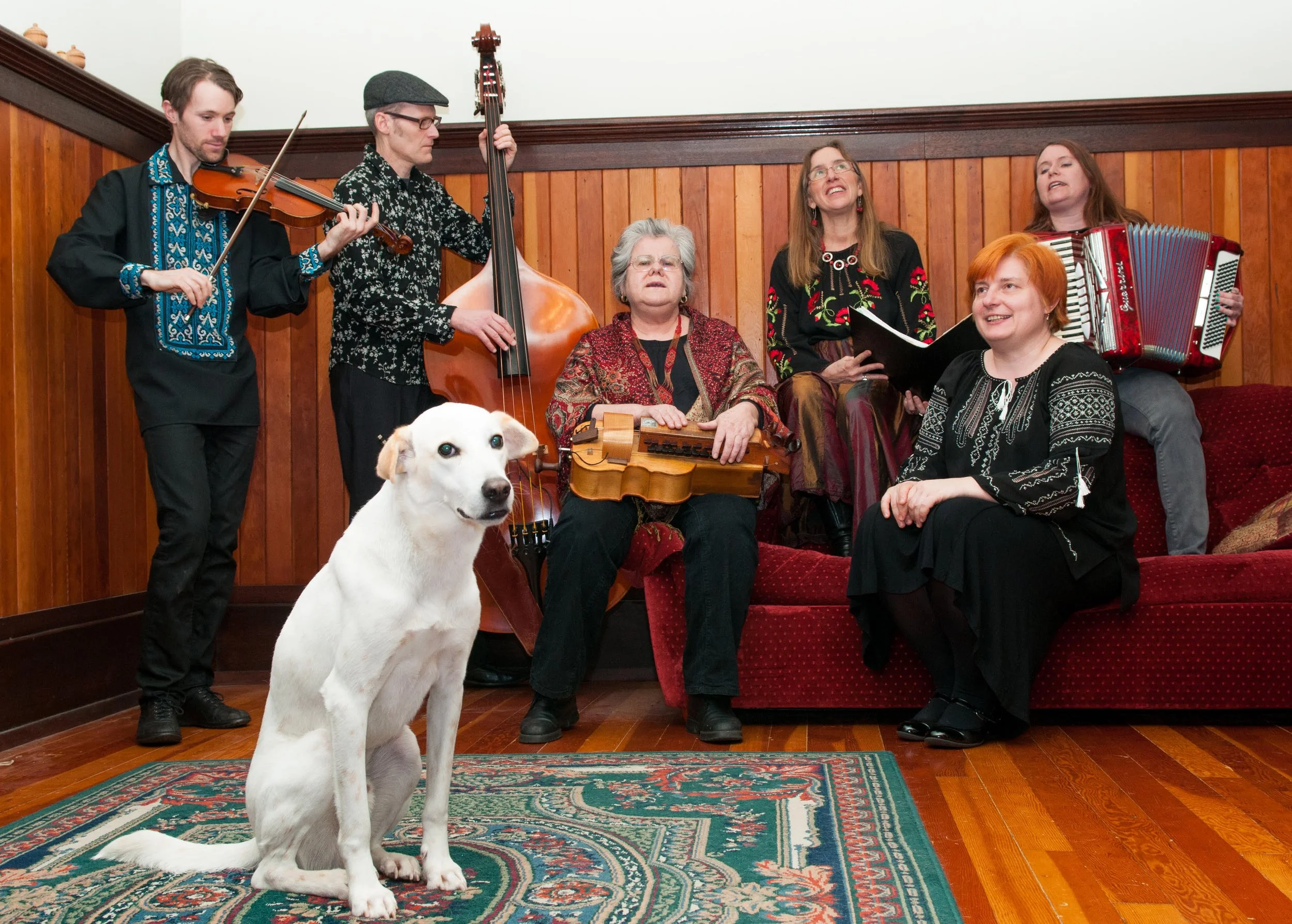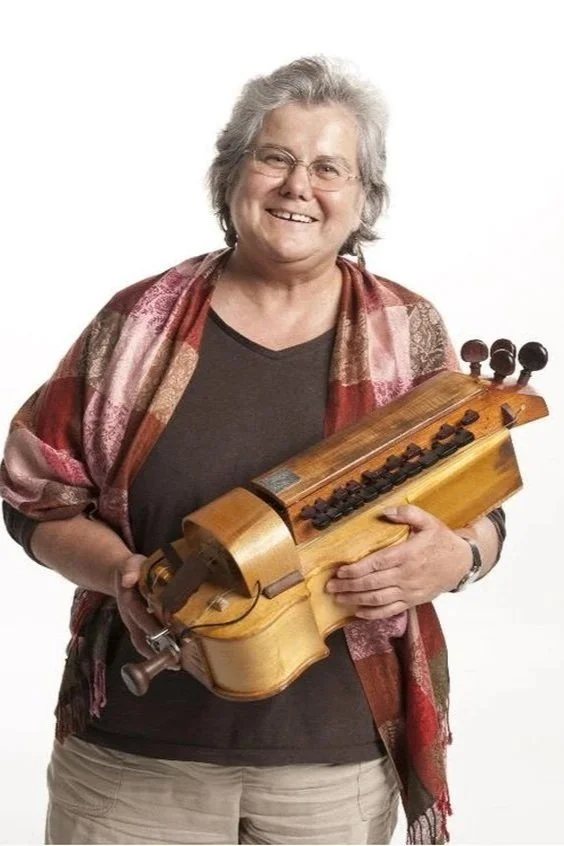Zeellia keeps the songs of Ukraine alive at VICO's Global Soundscapes Festival
Beverly Dobrinsky’s traditional, hurdy-gurdy-like lira sets the band’s loud, proud, and uncompromising tone in the face of war
Zeellia. Photo by Mark Montgomery
Zeellia opens the Vancouver Inter-Cultural Orchestra’s Global Soundscapes Festival, which runs at the Cultch from June 6 to 9
IT’S SMALL CONSOLATION for the havoc currently being visited on Ukraine by a mad dictator and his minions, but Vancouver’s sizeable Ukrainian population can at least take some pleasure in the return of Zeellia, whose purpose has always been to keep Ukrainian culture alive on the West Coast.
Granted, that sense of purpose had flagged somewhat following the 2016 release of its second LP, Willow Bridge, as the group’s founder Beverly Dobrinsky readily admits.
“My whole career, as a musician, has been about retrieving my culture and bringing visibility to the Canadian mainstream, but most of the Canadian mainstream was not that interested,” the Canadian-born singer says in a Zoom conversation from her East Van home.”
And as excellent as Willow Bridge is, it failed to alter that regrettable scenario. “For the first year, I really worked hard to promote it and get gigs and get it out there, but it really wasn’t happening enough—and those first two years are the critical years for any new work, so I wasn’t sure what was happening with Zeellia,” she points out. “Should we continue? I was kind of in that place of ‘Well, maybe it’s just time to let it go.’ And then Covid hit, so nobody was playing publicly, right? Everybody withdrew.”
Cue February 24, 2022, and the beginning of Vladimir Putin’s “special military operation”. Rogue Folk Club artistic director Steve Edge quickly pulled together a benefit to aid Ukraine, and naturally assumed Zeellia would top the bill. Dobrinsky wasn’t so sure. “I said, ‘Well, I’d love to do it. Let me just see where my band members are at.’ And within three weeks we did it: we pulled it together and did this very, very moving concert. It was almost like a highlight, for me, in terms of my career, because there was so much receptivity.
“People’s hearts were all open,” she continues, “and they were so confused and hurt, also, whether they were Ukrainian or not, that these things were happening in the world.”
An explicit part of Putin’s plan for conquest was the erasure of Ukrainian cultural identity. Ukraine was less a country than a rebel province of Russia, the Kremlin insisted, and Ukrainians were not a people, despite their distinct language, history, national costumes, and singular folk-music styles. In this, Putin and his warlords were taking a page from the Soviet dictator Joseph Stalin, who pursued a brutal program of forced starvation and mass killings to quell Ukrainian nationalism in the 1930s. That memory helps drive Ukrainian resistance today, and it also makes the very audible presence of the lira, or Ukrainian hurdy-gurdy, on Zeellia’s new Tse Tak Bulo (That’s How It Was), especially resonant and powerful. Although Zeellia includes a number of prominent instrumentalists, including accordionist Alison Jenkins, fiddler Elliot Vaughan, and bassist Russell Sholberg, Dobrinsky’s lira—with its echoes of another instrument of resistance, the Highland pipes—sets the album’s loud, proud, and uncompromising tone.
The lira, she explains, “is one of the old minstrel instruments, and there’s a whole tradition in Ukraine that goes back for hundreds of years but was interrupted by Stalin. It’s quite a crude instrument, and it was classically played by blind men; they usually had a sighted boy that was their guide, and they had a whole guild. That’s how they survived: they found this niche in the culture where they could support themselves with their music. Part of why they organized themselves in a guild was so they knew who was in what area at what time, so it wouldn’t be over-visited. And they had a whole repertoire of religious songs, folk songs, and songs that they would use to tell the news from one village to the another.
Beverly Dobrinsky with her Ukrainian lira.
“That’s probably why Stalin killed so many of them in the ’30s,” Dobrinsky adds. “He called them together under the guise of honouring them as these great folk heroes, and then he just had them shot. I often tell that story when I play lira, because I feel a certain responsibility to that heritage. That’s part of why I’m playing it; I’m bringing it back to life.”
There are definite echoes of the role of the griot in West African culture here, and other cultural correspondences are threaded throughout Tse Tak Bulo. With its “hey-ya-hey” refrain and eerie descending pitches at the end of certain lines, album standout “As I Walk Across Canada” will remind local listeners of Indigenous vocal styles, but Dobrinsky says that both elements are present in Ukrainian music. (The commonalities, however, are strong enough that she and Coast Salish composer Russell Wallace have collaborated on an arrangement of “As I Walk Across Canada” that incorporates one of the latter’s own pieces.) The song itself was collected on the Prairies by pioneering Ukrainian-Canadian folklorist Bohdan Klymasz, Dobrinsky adds, and it details the experience of a new immigrant in this vast, flat, and often unfriendly land.
“People sat and sang with him and they used these tropes from Ukrainian folk music, but they made new songs expressing their experience of being here,” she says. “And that song is in a male voice, and he’s talking about walking across Canada, literally, and whenever night comes, he just goes to sleep wherever he is. And in the song he’s come ahead of his family, his wife and his children, and he’s going to set things up for them—but he never hears from them again. It just never happens. So it’s a song of great sorrow and separation, and at the end he says, ‘Canada, you are such a deceitful country. I am separated from my wife and children.’”
Things have improved somewhat in the 21st century. Dobrinsky reports that a new wave of Ukrainian immigration dating back to before the present war has revitalized her community, and that Ukrainian-Canadians are no longer facing such fierce pressure to assimilate. Still, another beautiful and powerful aspect of Tse Tak Bulo is that it includes several short snippets of song and conversation that Dobrinsky herself collected from older Ukrainian-Canadians in Alberta and Saskatchewan during the 1990s. The combination of musical innovation and a palpable link to the past is profound—and, for Dobrinsky, profoundly necessary.
“Ukraine has a history of being colonized,” she explains. “It’s been constantly battled over, and so there’s a strong sense of culture and survival already in the people—and perhaps that’s what motivated me. Why did I care so fucking much about retrieving my culture? Why didn’t I just sing jazz? Because there’s something there! I still have to say that we’re alive, and we have something wonderful to bring to the table.”
Truer words have rarely been spoken.![]()














